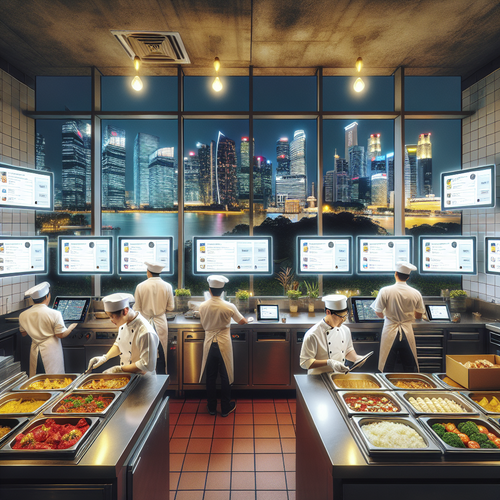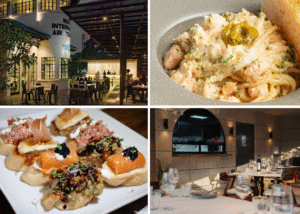As Singapore’s food delivery landscape grows, restaurants face increasing challenges managing orders from various platforms like GrabFood, Foodpanda, and Deliveroo. Juggling multiple delivery tablets often leads to errors, missed orders, and staff confusion. The solution lies in adopting a comprehensive restaurant online ordering system designed to integrate these platforms seamlessly, streamlining operations and enhancing customer satisfaction.
The Complexity of Multi-Channel Ordering for Singapore Restaurants
Managing multiple delivery platforms separately is becoming a daunting task for many F&B operators in Singapore. Each platform typically requires its own tablet, creating an operational headache.
Popular Delivery Aggregators in Singapore: GrabFood, Foodpanda, Deliveroo
GrabFood, Foodpanda, and Deliveroo dominate Singapore’s food delivery market with significant market shares. GrabFood is widely used due to Grab’s super-app ecosystem; Foodpanda appeals with its extensive restaurant partnerships; Deliveroo is favoured for premium and quick delivery services.
Challenges with Multiple Delivery Tablets
Restaurants using separate tablets for each aggregator commonly experience:
- Order mix-ups: Confusing orders from different devices may cause inaccuracies.
- Missed orders: Notifications may be overlooked amid tablet overload.
- Tablet fatigue: Managing multiple devices drains staff time and focus.
- Staff confusion: New or temporary staff struggle to handle varied platforms simultaneously.
What a Restaurant Online Ordering System Should Do
To address these challenges, an online ordering system must offer core features tailored to Singapore’s dynamic delivery ecosystem.
Aggregator Integration for Seamless Order Management
Integrating orders from GrabFood, Foodpanda, and Deliveroo into a unified dashboard allows restaurants to process all orders from one screen. This reduces manual data entry and errors, providing clarity and control.
Real-Time Order Sync and Notifications
Instant syncing means as soon as a customer places an order, kitchen and service staff receive timely notifications, minimizing delays and cancellations.
Delivery Tablet Management Alternatives
Robust software solutions can replace or significantly reduce the need for multiple tablets by consolidating orders digitally, lessening clutter and enhancing operational flow.
Benefits of Using an Integrated Online Ordering System in Singapore
An integrated system tailored for Singaporean restaurants brings numerous advantages:
Reducing Order Errors and Cancellations
With fewer mistakes and faster processing, restaurants boost customer satisfaction and protect their reputation.
Improved Staff Productivity and Reduced Training Time
A single interface simplifies tasks, making it easier to onboard new staff and increasing overall efficiency.
Centralized Reporting for Better Business Insights
Real-time sales dashboards display aggregated data in SGD, helping owners analyze performance across all platforms instantly.
How Klikit Helps Singapore Restaurants Overcome Delivery Tablet Overload
Klikit offers powerful OMS and POS integration solutions specifically designed for Singapore’s multi-aggregator landscape.
Aggregator Integration Features
Klikit connects directly with GrabFood, Foodpanda, and Deliveroo, enabling seamless intake of orders into one system.
Multi-Channel Order Consolidation and Sync
Klikit’s technology synchronizes orders across platforms in real-time, ensuring the kitchen is always up-to-date with all active orders.
Delivery Tablet Management and Reduction
By centralizing notifications, Klikit reduces reliance on multiple physical delivery tablets, decluttering kitchen counters and simplifying operations.
Steps for Singapore Restaurants to Implement an Online Ordering System Successfully
Implementing an online ordering system requires careful planning and consideration.
Assessing Current Ordering Pain Points
Begin with an audit of current workflows, identifying order errors, tablet overload, and staffing challenges.
Choosing a System with Strong Aggregator Support and Local Adaptation
Opt for a solution like Klikit that integrates major Singapore delivery aggregators and supports local currency (SGD).
Staff Training and Transition Planning
Ensure comprehensive training for staff to adapt to the new system smoothly, minimizing disruptions and maximizing benefits.
Frequently Asked Questions
Why do Singapore restaurants need to integrate multiple delivery aggregators into one system?
Managing separate orders from GrabFood, Foodpanda, and Deliveroo via multiple tablets increases the risk of errors, missed orders, and operational inefficiency. Integrating these aggregators into a single system reduces tablet overload, unifies order flow, and streamlines kitchen processes, ultimately enhancing customer satisfaction and reducing manual coordination.
Can an online ordering system eliminate the need for multiple delivery tablets?
Yes. With real-time order sync and OMS integration, restaurants receive consolidated order notifications on a single device or dashboard. This reduces or even eliminates the requirement for separate tablets dedicated to each delivery platform, reducing clutter and simplifying staff workflows.
How does real-time order sync help improve customer satisfaction?
Real-time order synchronization ensures that kitchen and service staff receive immediate updates on new and modified orders, reducing preparation delays and cancellations. Faster and accurate order handling leads to timely deliveries and happier customers.
What are key features to look for in a restaurant online ordering system in Singapore?
Important features include aggregator integration (with GrabFood, Foodpanda, Deliveroo), real-time reporting dashboards in SGD, OMS/POS synchronization, multi-channel order consolidation, and effective delivery tablet management or replacement capabilities.




